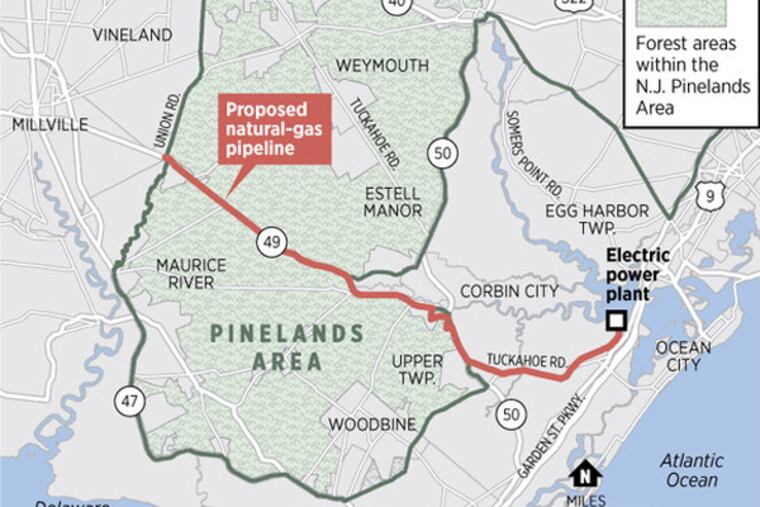Controversial plan to build pipeline through New Jersey Pinelands appears dead
A controversial plan to build pipeline through New Jersey Pinelands could be dead after one of the reasons it was supposed to exist is now gone and environmentalists are rejoicing. However, the company behind the pipeline said it may seek to still build, but possibly with a different path.

A plan to build a controversial $90 million gas pipeline through the New Jersey Pinelands could be dead after a main reason for its existence is now gone, and environmentalists are rejoicing.
However, the company behind the pipeline said it still may seek to build, but possibly with a different path.
South Jersey Gas had received approval from the Pinelands Commission to construct a 22-mile-long, mostly underground pipeline known as the Cape Atlantic Reliability Project. It was designed to run from Millville to Upper Township in Cape May County to feed the B.L. England electric generating plant. The plant was under order by the state to stop burning coal. The plan was to convert it to natural gas fed by the pipeline.
The plant’s owner, RC Cape May Holdings LLC, however, notified the state this week in a court document that it would not be repowering the plant. The state Attorney General’s Office then filed paperwork notifying a court that new information “undermines the basis” for the pipeline’s path through the Pinelands.
“This is a big win for clean air and a major setback for the South Jersey Gas pipeline," Jeff Tittel, director of the New Jersey Sierra Club, said in a statement. "The B.L. England plant would have been the largest polluter and greenhouse gas emitter in this part of South Jersey. … Without this plant, there is no need for the SJG pipeline. The pipeline should now be stopped.”
Carleton Montgomery, executive director of the Pinelands Preservation Alliance, called it “a big victory for the Pinelands." He said the Pinelands Commission should withdraw its approval.
Both nonprofit conservation groups have fought the pipeline for years. Environmental groups have also sued.
Marissa Travaline, a spokesperson for South Jersey Gas, said the change does not necessarily mean there will be no pipeline, but she acknowledged any new line might have a different path. Travaline said the pipeline had another function: to serve as a secondary line to 142,000 customers in Cape May and Atlantic Counties. A second line is needed, she said, if the existing line fails from, say, a major storm or other damage, which could knock it out of service for weeks or even months.
“So, for us, that remains a really high priority,” she said.
Dave Robbins, president of South Jersey Gas, said in a statement that while he was “disappointed” that the B.L. England plant would not power up, getting a pipeline built is still a priority. He said the company has already “begun to explore alternative solutions" for a secondary supply of gas.
Michael J. Renna, president and chief executive officer of South Jersey Industries, the parent company of South Jersey Gas, addressed the issue during a quarterly conference call Thursday with investment analysts. Renna told investors he was “very disappointed" with B.L. England’s owners for backing out of the project. He said details for a possible alternative could be announced by the end of March. That could involve looping off some existing feeds in a smaller-scale project.
The Pinelands pipeline called for a 24-inch main to be installed along Route 49 and was one of two approved plans by the Pinelands Commission at often tempestuous meetings during former Gov. Chris Christie’s tenure. Environmentalists contended that Christie had packed the body with pro-development commissioners.
The other pipeline, known as the Southern Reliability Link, is approved to run 12.1 miles through the Pinelands National Reserve and military base within it. That plan is by New Jersey Natural Gas, and has also been challenged in court but is currently under construction.
Staff writer Andrew Maykuth contributed to this article.